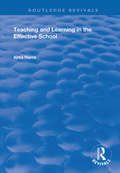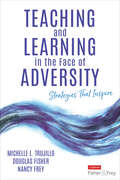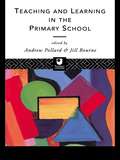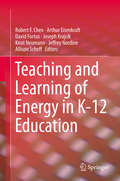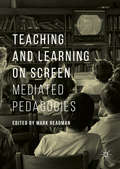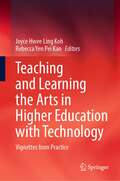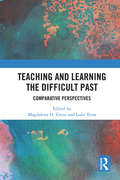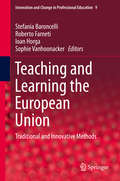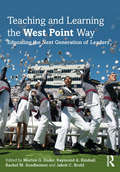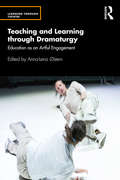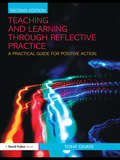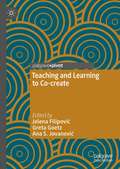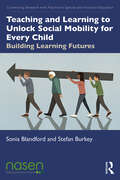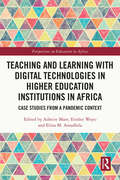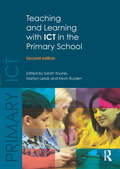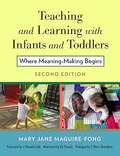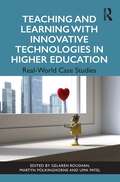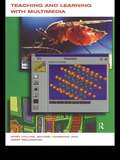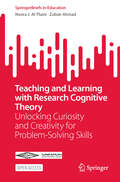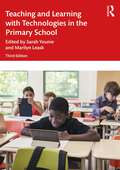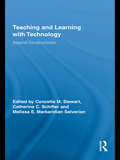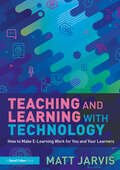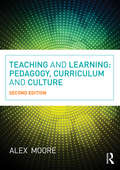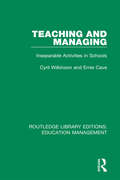- Table View
- List View
Teaching and Learning in the Effective School (Routledge Revivals)
by Alma HarrisFirst published in 1999, this volume attempts to draw the literature on school effectiveness and teacher effectiveness together in one volume. Its central tenet is that classroom effectiveness is central to school effectiveness and that there is much to be gained from integrating the literature on effective schooling and effective teaching. Issues discussed include departments, classroom communication and teacher expectation, motivation and feedback.
Teaching and Learning in the Face of Adversity: Strategies That Inspire
by Douglas Fisher Michelle L. Trujillo Nancy Frey"You may encounter many defeats, but you must not be defeated. In fact, it may be necessary to encounter the defeats so you can know who you are, what you can rise from, how you can still come out of it." —Maya Angelou Adversity is all around us. Although we can′t always avoid it, we can prepare ourselves and our students to respond in a healthy and hopeful way. Teaching and Learning in the Face of Adversity is a practical and heartfelt book that empowers educators with applicable strategies to respond to challenges, inspire students, and foster a positive school environment. The authors share the critical skills that educators and students can cultivate to elevate the ability to respond to barriers, challenges, and setbacks, plus: Practical strategies, insights, and reflection prompts Menus of practices to promote student agency, belonging, relationships, and repair harm The voices of real teachers, students, and educational leaders The range of challenges that can arise in our work and effective ways to respond Adversity may be ever-present, but with the resources in this book, we can empower ourselves, our colleagues, and our students to persevere in the face of it.
Teaching and Learning in the Face of Adversity: Strategies That Inspire
by Douglas Fisher Michelle L. Trujillo Nancy Frey"You may encounter many defeats, but you must not be defeated. In fact, it may be necessary to encounter the defeats so you can know who you are, what you can rise from, how you can still come out of it." —Maya Angelou Adversity is all around us. Although we can′t always avoid it, we can prepare ourselves and our students to respond in a healthy and hopeful way. Teaching and Learning in the Face of Adversity is a practical and heartfelt book that empowers educators with applicable strategies to respond to challenges, inspire students, and foster a positive school environment. The authors share the critical skills that educators and students can cultivate to elevate the ability to respond to barriers, challenges, and setbacks, plus: Practical strategies, insights, and reflection prompts Menus of practices to promote student agency, belonging, relationships, and repair harm The voices of real teachers, students, and educational leaders The range of challenges that can arise in our work and effective ways to respond Adversity may be ever-present, but with the resources in this book, we can empower ourselves, our colleagues, and our students to persevere in the face of it.
Teaching and Learning in the Primary School
by Andrew Pollard Jill BourneThis sourcebook offers a unique summary into all that was important in primary education during the 1990s. It provides almost fifty key readings on the field which are grouped around six major topics: * learners* teachers* classrooms* curriculum* assessment* school and education policy. Over half of the readings focus on real life cases - such as pupils, teachers, classrooms or schools - as a means of conveying some of the interpersonal subtleties of teaching and learning in primary schools. At the same time, these cases highlight important current topics and debates in primary education and often provide insights into practical ways of meeting the challenges which are posed. Other articles are more explicitly analytical and provide conceptual frameworks, overviews or critiques of their fields. This is an excellent resource and guide for primary school teachers, and students studying on PGCE courses.
Teaching and Learning of Energy in K - 12 Education
by Arthur Eisenkraft Robert F. Chen David Fortus Joseph Krajcik Knut Neumann Jeffrey Nordine Allison ScheffThis volume presents current thoughts, research, and findings that were presented at a summit focusing on energy as a cross-cutting concept in education, involving scientists, science education researchers and science educators from across the world. The chapters cover four key questions: what should students know about energy, what can we learn from research on teaching and learning about energy, what are the challenges we are currently facing in teaching students this knowledge, and what needs be done to meet these challenges in the future? Energy is one of the most important ideas in all of science and it is useful for predicting and explaining phenomena within every scientific discipline. The challenge for teachers is to respond to recent policies requiring them to teach not only about energy as a disciplinary idea but also about energy as an analytical framework that cuts across disciplines. Teaching energy as a crosscutting concept can equip a new generation of scientists and engineers to think about the latest cross-disciplinary problems, and it requires a new approach to the idea of energy. This book examines the latest challenges of K-12 teaching about energy, including how a comprehensive understanding of energy can be developed. The authors present innovative strategies for learning and teaching about energy, revealing overlapping and diverging views from scientists and science educators. The reader will discover investigations into the learning progression of energy, how understanding of energy can be examined, and proposals for future directions for work in this arena. Science teachers and educators, science education researchers and scientists themselves will all find the discussions and research presented in this book engaging and informative.
Teaching and Learning on Screen
by Mark ReadmanWhat stories are told about teaching and learning on TV and in film? And how do these stories reflect, refract and construct myths, anxieties and pleasures about teaching and learning? This collection looks at how pedagogy is represented on screen, and how TV programs and films translate pedagogic ideas into stories and relationships. International in scope, with case studies and analysis from the UK, US, Australia, Turkey and Brazil--the book adopts a critical stance in relation to the ways in which theories of learning and myths about education are mobilized on screen. Teaching and Learning on Screen: Mediated Pedagogies provides a stimulating addition to the field of media and cultural studies, while also promoting debate about particular pedagogic models and strategies that will contribute to the professional development of educators and those involved in teacher education.
Teaching and Learning the Arts in Higher Education with Technology: Vignettes from Practice
by Joyce Hwee Ling Koh Rebecca Yen Pei KanThis book is an inquiry about the possibilities of using technology to support the education of artists within higher education contexts. Even though technology-enhanced learning and teaching may seem incongruent with the long-established studio-based cultures of making and performing, it is increasingly becoming a pivotal point to connect artistes to potential audience and markets. Amidst the COVID-19 pandemic, technology is also the crucial linchpin for educational continuity of student artists. This book explores how technology could enhance the education of artists and designers as they continue to create, make, and add value to life and society through their artistry. It draws upon the experiences of the Nanyang Academy of Fine Arts (NAFA), a pioneering arts institution in Singapore with over 80 years of institutional history. Through 9 vignettes, this book illustrates technology-enhanced pedagogical practices that have been implemented in different artistic learning spaces including classroom, studio, and stage as well as institutional support strategies. With a naturalistic stance, these chapters seek to illuminate realistic pictures of teaching and learning that are being uncovered by artist educators as they sought to integrate technology within teaching practices using available technologies and within the classes that they are teaching. It is hoped that this book will stimulate conversation among artist educators about possible pedagogical models, as well as inform higher arts institutions about the contextual strategies needed to support the creation of technology-enhanced pedagogical practices.
Teaching and Learning the Difficult Past: Comparative Perspectives
by Magdalena H. Gross Luke TerraBuilding upon the theoretical foundations for the teaching and learning of difficult histories in social studies classrooms, this edited collection offers diverse perspectives on school practices, curriculum development, and experiences of teaching about traumatic events. Considering the relationship between memory, history, and education, this volume advances the discussion of classroom-based practices for teaching and learning difficult histories and investigates the role that history education plays in creating and sustaining national and collective identities.
Teaching and Learning the European Union
by Stefania Baroncelli Roberto Farneti Ioan Horga Sophie VanhoonackerThis volume examines the EU's changing educational context and its challenges. Based on an extensive survey of more than 2000 European Studies courses in 30 European countries, it maps and analyses the features of teaching methodologies as they emerge from both disciplinary as well as interdisciplinary curricula. It presents a series of case studies on some of the most-used innovative teaching tools emerging in the field such as simulation games, e-learning, problem based learning, blended learning, and learning through the use of social networks. Based on the contributors' own experiences and academic research, the book examines both strengths and possible pitfalls of these increasingly popular methods. The book's critical approach will inspire educators and scholars committed to improving the teaching methods and tools in the area of European Studies and other programmes of higher education facing similar challenges.
Teaching and Learning the West Point Way: Educating the Next Generation of Leaders
by Morten G. Ender; Raymond A. Kimball; Rachel M. Sondheimer; Jakob C. BruhlTeaching and Learning the West Point Way is a unique compendium of the best teaching and learning practices from one of the most celebrated and storied undergraduate teaching and learning environments and institutions in America – the United States Military Academy at West Point, New York, USA. Drawing on the broad academic curriculum that the students follow at West Point – in addition to military leadership, character development, and competitive athletics – this book describes proven and effective undergraduate pedagogy across a number of academic disciplines. Case studies, strategies and techniques, empirical teaching and learning research results, syllabi, and assignments developed and deployed by West Point faculty are included, which faculty in other higher education institutions can adapt and apply to their own programs and courses. An accompanying companion website provides additional syllabi, course guides, lesson plans, PowerPoint activities, and lecture slides, as well as videos of the editors and authors discussing how key concepts in their chapters might be applied in different teaching and learning contexts. This is an opportunity to gain an in-depth insight into the programs and practices inside one of the world’s premier leadership development and educational institutions. It should appeal to new and experienced faculty and administrators interested in course creation and syllabus design across a wide range of disciplines in educational institutions and military academies across the globe.
Teaching and Learning through Dramaturgy: Education as an Artful Engagement (Learning Through Theatre)
by Anna-Lena ØsternThe aim of this book is to contribute a dramaturgical perspective to education. The authors write from a dramaturgical perspective about the planning of teaching, leadership in the classroom, the teacher-body, the teacher’s oral skills and ethics, communication, and about the spaces in which teaching takes place. The book is written with the pre-understanding that the ways in which art creates knowledge need to be illuminated and articulated more clearly in educational thinking, thereby enhancing artful engagement in education. Dramaturgical perspectives are presented as such a way – a form of knowledge that the artform of drama/theatre can contribute to teaching and learning in general. Through examples and analyses of empirical material, as well as through theoretical perspectives, the authors show chapter by chapter how dramaturgy and a dramaturgically inspired language and concepts create more possibilities of choice for teachers in planning and carrying out their teaching. Teaching and Learning through Dramaturgy brings to the forefront what will be enabled in teaching and planning of teaching, by making use of a dramaturgically inspired language and action, what in principle is possible in every subject.
Teaching and Learning through Reflective Practice: A Practical Guide for Positive Action
by Tony GhayeNow in its second edition, Teaching and Learning through Reflective Practice is a practical guide to enable all those involved in educational activities to learn through the practices of reflection. The book highlights the power that those responsible for teaching and learning have to appraise, understand and positively transform their teaching. Seeing the teacher as a reflective learner, the book emphasises a strengths-based approach in which positivity, resilience, optimism and high performance can help invigorate teaching, enhance learning and allow the teacher to reach their full potential. This approach busts the myth that reflection on problems and deficits is the only way to better performance. The approach of this new edition is an ‘appreciative’ one. At its heart is the exploration and illustration of four reflective questions: What’s working well? What needs changing? What are we learning? Where do we go from here? With examples drawn from UK primary teacher education, the book reveals how appreciative reflective conversations can be initiated and sustained. It also sets out a range of practical processes for amplifying success. This book will be a must have for undergraduate and PGCE students on initial teacher training programmes. It will also interest practising teachers, teacher educators and those on continuing professional development courses.
Teaching and Learning to Co-create
by Jelena Filipović Greta Goetz Ana S. JovanovićThis edited book approaches the learning experience as a creative, constructive process from an epistemological orientation that combines transdisciplinary, participatory, and collaborative approaches to explore the most constructive ways forward for a networked constructivist (project- and problem-based) pedagogy. The volume emphasizes the value of a number of modes of inquiry that, among others, include ethnography, auto-ethnography, corpus analysis, narrative analysis, and their many intersections in the process of academic maturation and growth. This book will be of interest to applied linguists, sociolinguists, researchers, and educators of topics related to higher education and academic maturation, networked learning, qualitative inquiry and transdisciplinary studies.
Teaching and Learning to Unlock Social Mobility for Every Child: Building Learning Futures (Connecting Research with Practice in Special and Inclusive Education)
by Sonia Blandford Stefan BurkeyTeaching and Learning to Unlock Social Mobility for Every Child is a topical and insightful text that guides readers through evidence-based practice that will improve outcomes for all involved in education, increasing social mobility and inclusion in every sense. In the past 30 years, how children and young people learn has changed considerably as challenges of social mobility become more apparent. Cultural and social economic disadvantage is evident, as is the need to focus on mutuality in education, whereby all children and young people are valued regardless of their background, challenges or needs. In this context, Teaching and Learning to Unlock Social Mobility for Every Child is the first work to capture and clearly explain practical teaching and learning approaches that can be used in any school. It circles around the creativity and technology of pedagogy, exploring an educational agenda that is genuinely rooted in social mobility for all children.Written accessibly and full of case studies, this book is intended to guide practitioners and stakeholders at all levels of education from school leaders to researchers, students and teachers. It will help them to impart the skills and capacities which children and young people require to drive their future social mobility and address the challenges they will face on their own terms.
Teaching and Learning with Digital Technologies in Higher Education Institutions in Africa: Case Studies from a Pandemic Context (Perspectives on Education in Africa)
by Admire Mare Erisher Woyo Elina M. AmadhilaThis book critically examines how the COVID-19 pandemic has stimulated digital innovation within higher education using case studies from Africa. Imagining a future for post-pandemic higher education, it analyses the challenges and opportunities of remote teaching and learning. The book explores the structural barriers around access to higher education and how these were reconfigured and amplified by technology-dependent teaching and learning. Case studies from countries across Africa provide unique insights into the challenges experienced by Higher Education Institutions (HEIs) during the COVID-19 pandemic, examining examples of emergent pedagogies such as online, mobile and social media-enhanced teaching, and blended learning. The chapters consider online assessment and teacher professional development, critically examining some of the benefits and structural challenges of digital technology integration in the context of pre-existing education disparities (such as students and teachers living in poverty-stricken and highly unequal societies). Offering invaluable insights into higher education in Africa, the book will be essential reading for researchers, scholars, and students in the fields of higher education study, digital education and educational technology, and African and comparative education. It will also be of interest to higher education managers and policymakers.
Teaching and Learning with ICT in the Primary School
by Kevin Burden Marilyn Leask Sarah YounieThe new edition of Teaching and Learning with ICT in the Primary School introduces practising and student teachers to the range of ways in which ICT can be used to support and extend teaching and learning opportunities in their classrooms. Fully updated and expanded with brand new chapters reflecting the abundant changes in the field since the first edition was published, it offers practical guidance underpinned by the latest research and teaching in the field. It is illustrated throughout with case studies and examples together with a glossary explaining key terms. It focuses on how technology-based practices can support the teaching of individual subjects, as well as a range of teaching and learning styles. Key topics covered include: Support reading and writing with ICT Enhancing mathematics with technology ICT in the foundation subjects Computer programming Creativity and ICT ICT and sustainability Linking home and school Digital technologies for special educational needs Mobile technologies Gaming and virtual worlds Assessment E-Safety Written for all training primary teachers, as well as more experienced teachers and ICT co-ordinators looking for guidance on the latest innovative practice,Teaching and Learning with ICT in the Primary School, 2nd edition offers advice and ideas for creative, engaging and successful teaching and learning.
Teaching and Learning with Infants and Toddlers: Where meaning-making Begins
by Mary Jane Maguire-FongIn the short span of three years, infants learn to move with confidence and grace, to converse with ease, to investigate and solve problems, and to help others in need―building an exquisite foundation for all learning that follows. Each chapter of this updated edition draws from research and real-life infant care settings to provide valuable insights into how to design an infant care program, plan curriculum, assess learning, and work with families. <P> This popular resource is inspired by the philosophy of early childhood education developed in the schools in Reggio Emilia, Italy; from the work of Magda Gerber and Emmi Pikler; and from the many dedicated researchers intent on figuring out how infants make meaning.
Teaching and Learning with Innovative Technologies in Higher Education: Real-World Case Studies
by Gelareh Roushan Martyn Polkinghorne Uma PatelTeaching and Learning with Innovative Technologies in Higher Education provides a wealth of expertly curated case studies demonstrating how educators and technologists can leverage emerging digital technologies to enhance students’ experiences. As university staff integrate transformative digital learning tools into their pedagogical practices with a mix of excitement and consternation, new insights are needed into the opportunities, success and limitations of these fast-evolving tools. This book presents real-world examples of effective, digitally enriched approaches to teaching delivery and standards, student engagement and inclusivity, immersive simulations and environments and beyond. Spanning a diverse, comprehensive range of digital technologies deployed in higher education, these practical case studies will guide novice and experienced academics across disciplines in updating their instructional skills and course content for new generations of learners.
Teaching and Learning with Multimedia
by Janet Collins Jerry Wellington Michael HammondThis book is an introduction to the issues and practicalities of using multimedia in classrooms - both primary and secondary, and across a range of subject areas. The book draws on material from a range of case studies and focuses on areas of concern for teachers and researchers. Using IT effectively continues to be a problem for many teachers, and there is still a long way to go toward organising this properly. The book takes a thorough look at IT in the school, discussing and examining issues such as: * IT and the National Curriculum * foreign language teaching * differing curricular needs * opportunities and constraints of groupwork * talking books and primary reading * ways in which multimedia supports readers. The book also looks at some of the more philosophical issues such as the implications of home-computers and the limits of independent learning, and the notion of "edutainment" - the relationship of motivation and enjoyment to learning. Finally, the book makes comparisons across the curriculum and between primary and secondary sectors and raises questions about the future of IT in schools, arguing that teachers should make a significant contribution to decisions about future development.
Teaching and Learning with Research Cognitive Theory: Unlocking Curiosity and Creativity for Problem-Solving Skills (SpringerBriefs in Education)
by Zubair Ahmad Noora J. Al-ThaniThis open access volume explores the transformative role of Research Cognitive Theory (RCT) in education, emphasizing its application in fostering curiosity, creativity, innovation, problem-solving skills, and cognitive development across all educational levels in students and professional development in teachers. Through detailed discussions on integrating research-based learning with STEM education, the book offers practical insights for educators, researchers, and policymakers aiming to enhance teaching methodologies and student outcomes. By bridging the gap between theory and practice, this work serves as a vital resource for those seeking to cultivate inquiry-driven learning environments. Readers benefit from actionable strategies, case studies, and a comprehensive understanding of how RCT can revolutionize modern education.
Teaching and Learning with Technologies in the Primary School
by Marilyn Leask Sarah YounieThis fully updated third edition of Teaching and Learning with Technologies in the Primary School introduces practising and student teachers to the range of ways in which technology can be used to support and extend teaching and learning opportunities in their classrooms.Newly expanded to include 50% brand new chapters reflecting the abundant changes in the field since the last edition was published, it offers practical guidance underpinned by the latest research and teaching in the field. The authors draw on the extensive experience of educators in Australia, England, Ireland, Scotland, South Africa, the U.S.A. and Wales to provide local, national and international examples of the application of digital technologies to teaching and learning across the primary curriculum.Illustrated throughout with case studies and examples together with a glossary explaining key terms, chapters focus on how technology-based practices can support the teaching of individual subjects, as well as a range of teaching and learning styles. Key and new topics covered include:- Supporting reading and writing with technology- Technology in the early years- Developing e-skills of parents- Use of Virtual Reality in learning- PedTech- Resilience in the digital worldWritten for all training primary teachers, as well as more experienced teachers and technology co-ordinators looking for guidance on the latest innovative practice, Teaching and Learning with Technologies in the Primary School, 3rd edition, offers advice and ideas for creative, engaging and successful teaching and learning.
Teaching and Learning with Technology: Beyond Constructivism (Routledge Research in Education #Vol. 37)
by Concetta M. StewartToday, new media is both augmenting and extending the traditional classroom with a variety of technology-based tools available to both students and faculty, and has created "new" virtual classrooms for anywhere, anytime availability to education. Despite the enormous potential for technology to support the educational enterprise in this emerging "creative" economy, technologies are still not yet fully integrated in the classroom and their association with educational outcomes is as-yet unclear. This book profiles scholarly work from around the world to examine closely the effectiveness of the newest media in education at bridging the gaps among and between teachers, students and subject matter at all levels, from K-12 through adult education. These pieces are theory-based investigations with implications for future research, theory and application. Contributors examine how the fields of education and new media have evolved and are continuing to evolve pedagogically and practically, from predominantly instructivist, with a passive, one-way teaching format; to constructivist, including teacher- and learner-controlled, sensorially immersive and socially interactive exchanges. This book will be of interest to students and faculty in the areas of new media in education, including distance learning, online learning and "virtual" learning.
Teaching and Learning with Technology: How to Make E-Learning Work for You and Your Learners
by Matt JarvisTeaching and Learning with Technology sets out key principles for digital learning underpinned by research evidence. It explores the ways in which technology can help teachers to achieve their goals and support good pedagogy and offers practical strategies for using technology when planning and delivering effective lessons. Drawing on examples from across the curriculum and highlighting a wide range of key technologies, chapters cover: Live remote teaching Delivering content and instruction Using technology to assess learning Alternative learning platforms Ensuring accessibility and personalising learning E-safety, safeguarding and legal compliance Written by a leading expert in digital education and filled with easy-to-implement tips, this book is an essential guide for all teachers delivering lessons online.
Teaching and Learning: Pedagogy, Curriculum and Culture (Itt Ser.)
by Alex MooreTeaching and Learning: Pedagogy, Curriculum and Culture is designed to share important theory with readers in an accessible but sophisticated way. It offers an overview of the key issues and dominant theories of teaching and learning as they impact upon the practice of education professionals in the classroom. This second edition has been updated to take account of significant changes in the field; young people’s use of digital technologies, the increasing involvement of world of business in state education, and ongoing high-profile debates about assessment, to name but a few. It examines the global move from traditional subject-and-knowledge based curricula towards skills and problem-solving and discusses how the emphasis on education for citizenship has forced us to reconsider the social functions of education. Central topics also covered include: an assessment of the most influential theorists of learning and teaching the ways in which public educational policy impinges on local practice the nature and role of language and culture in formal educational settings an assessment of different models of 'good teaching' alternative models of curriculum and pedagogy. With questions, points for consideration and ideas for further reading and research throughout, this book delivers discussion and analysis designed to support understanding of classroom interactions and to contribute to improved practice. It will be essential reading for all student teachers, those engaged in professional development, and Education Studies students.
Teaching and Managing: Inseparable Activities in Schools (Routledge Library Editions: Education Management)
by Ernie Cave Cyril WilkinsonOriginally published in 1987. It has been questioned whether management theory can offer viable insights for education, largely because, unlike many other institutions, there is no exclusive managerial structure in schools - the roles of the teacher and manager are inextricably linked. This dual role usually even includes the head of a school. Nevertheless, some schools seem to be more effective than others. This book argues that, although teaching and managing are inseparable, they are not necessarily indistinguishable activities and that important non-teaching roles can be identified through critical analysis of practice in different educational contexts. The first section describes developments in organisational theory that are producing useful models for school life and also for other comparable areas in the public sector, such as health, the police and local government. The second section examines the actual processes of management in context by analysing how leadership, planning, decision-making and communication operate in real situations.
